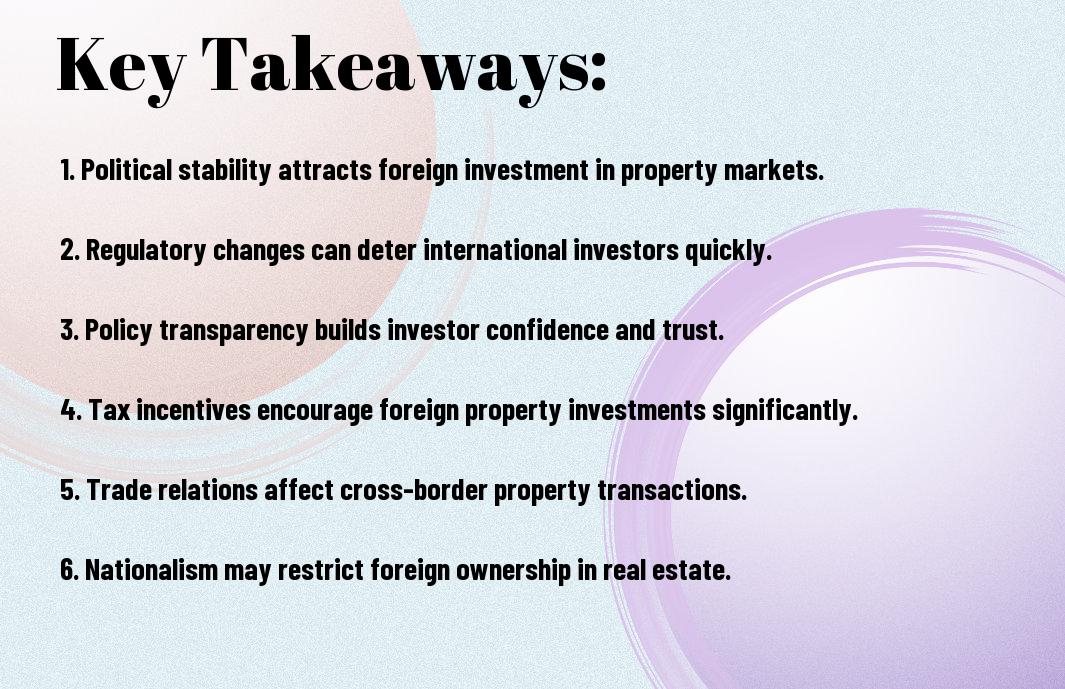With the increasing interconnectivity of global markets, understanding how politically-driven economic policies affect foreign investment in property becomes imperative for you as an investor. Changes in government regulations, tax incentives, and political stability can all significantly influence your investment decisions and potential returns. In this post, we will explore the ways political dynamics shape the real estate landscape, equipping you with the insights needed to navigate these complexities in your property investments.
Key Takeaways:
- Politically-driven economic policies can create an unstable investment climate, influencing foreign investors’ perceptions of risk and return associated with property investments.
- Government incentives or disincentives can significantly affect foreign capital flows, with favorable policies attracting investment while restrictive regulations can deter it.
- Political stability and transparency in economic decision-making are vital for fostering trust among foreign investors, impacting their willingness to invest in property markets.
Understanding Politically-Driven Economic Policies
While politicians play a significant role in shaping the economic landscape, their policies can either foster or hinder foreign investment in property markets. You should be aware that these policies may include regulations on foreign ownership, taxation, and investment incentives, all of which directly impact real estate attractiveness for investors.
Definition and Scope
At its core, politically-driven economic policies refer to government actions and regulations that influence economic behavior. These policies encompass a wide range of topics, including trade agreements, property taxation, and land-use regulations, all of which can impact your decisions as a foreign investor in property markets.
Historical Context
Before delving into current policies, it’s important to look back at how past political decisions have shaped economic environments. From the liberalization of markets in the late 20th century to recent protectionist tendencies, understanding these shifts can offer valuable insights into how today’s policies may evolve.
Economic trends over the past few decades reveal a pattern of shifting ideologies that have both opened up and restricted foreign investment in various countries. Changes in leadership often bring new policies; for instance, some governments have actively encouraged foreign investment through tax incentives, while others have imposed strict regulations or barriers. By analyzing these historical patterns, you can better navigate the current investment landscape and anticipate how political changes might affect your real estate decisions.
Foreign Investment in Property: An Overview
You will find that foreign investment in property is a significant aspect of today’s global economy. This investment can take various forms, including residential, commercial, and industrial properties. With countries increasingly recognizing the importance of attracting foreign capital, understanding the dynamics of foreign investment in real estate becomes imperative for investors and stakeholders alike.
Types of Foreign Investments
You may encounter various types of foreign investments in property, each serving different investor needs and goals. These include:
- Residential Real Estate
- Commercial Real Estate
- Industrial Properties
- Real Estate Investment Trusts (REITs)
- Development Projects
The diversity in these investment types allows for a wide range of opportunities in the real estate market.
| Investment Type | Description |
|---|---|
| Residential Real Estate | Investing in homes and apartments for rental or resale. |
| Commercial Real Estate | Office spaces, retail properties, and hotels. |
| Industrial Properties | Warehouses, manufacturing units, and distribution centers. |
| REITs | Companies that own, operate, and finance income-producing real estate. |
| Development Projects | Investing in the construction and development of new properties. |
Importance of Real Estate Sector
The real estate sector plays a vital role in economic stability and growth. It creates job opportunities, stimulates local economies, and generates tax revenues. By attracting foreign investment, countries can further enhance their real estate market, increasing overall prosperity.
Another vital aspect is the intertwining of real estate with other economic sectors. A robust real estate market can lead to significant improvements in infrastructure, finance, and even tourism, driving economic growth in multiple dimensions. Understanding these elements will help you see why the real estate sector is so influential in attracting foreign investment and fostering a balanced economy.
The Role of Government in Economic Policy
Your understanding of economic policy is necessary when considering foreign investment in property. Government actions, including regulations and incentives, shape the market landscape. These policies can either attract or deter investors, impacting the flow of foreign capital into real estate markets. You need to be aware of how these decisions influence property values and the overall investment climate.
Regulatory Frameworks
Behind every property investment opportunity lies a regulatory framework established by the government. These regulations encompass zoning laws, building codes, and investment restrictions, all of which dictate how properties can be developed or utilized. A transparent and stable regulatory environment reassures foreign investors, making them more likely to commit capital to your market.
Taxation and Incentives
About taxation and incentives, the government plays a key role in shaping investment decisions. Your property market may thrive or suffer based on tax rates and the incentives provided to investors. Favorable tax policies can significantly enhance the attractiveness of foreign investment, while high taxes may push potential investors away.
To stimulate foreign investment, governments often consider offering tax incentives, such as reduced rates or exemptions for certain types of investments. You may observe that these incentives not only draw foreign capital but also encourage economic development in underserved areas. Understanding local tax legislation and potential incentives can empower you to provide valuable insights to prospective investors, making your market more appealing.
Case Studies of Foreign Investment Impact
All foreign investment trends can significantly illustrate the effect of politically-driven economic policies. Understanding these case studies can provide valuable insights for prospective investors:
- In 2018, Singaporean investment in the UK property market surged by 50%, attributed to favorable tax policies.
- In 2019, foreign direct investment in Canadian real estate dropped by 30% due to implemented foreign buyer taxes.
- Australia saw a 20% increase in foreign property investment in 2020 following the easing of regulations for overseas buyers.
- The U.S. experienced a 15% decline in foreign investments in 2021 due to heightened immigration restrictions.
Success Stories
Between 2015 and 2020, Germany attracted €10 billion in foreign investments, driven by policies promoting urban development and sustainable housing practices, making it an attractive market for international investors.
Failures and Challenges
The economic climate often poses challenges that can hinder foreign investment. The potential threat of increasing tariffs and stringent regulations can add complexity to the property investment landscape.
Another significant challenge arises when political uncertainty creates a climate of hesitancy amongst foreign investors. Altered trade agreements or shifts in market regulations can deter investment, causing instability in property markets. Countries with fluctuating policies may face a detrimental impact on their attractiveness as investment destinations, pushing potential investors to seek more stable environments elsewhere.
Economic Implications of Policy Changes
Once again, shifts in economic policies can significantly influence your property investments. Altered regulations may lead to unpredictable market dynamics, impacting investor confidence and property values. For a comprehensive understanding, refer to the Political Implications of Foreign Investment in the United … which highlights specific examples of how these policies shape the market landscape.
Market Reactions
Any change in political policies can lead to immediate reactions in the property market. Investor sentiment can swing rapidly, affecting demand, property prices, and overall market stability.
Long-term Effects on Investment
Below, understanding the long-term effects on your investment is vital for strategic planning. The consequences of policy changes often unfold gradually, influencing both market perceptions and investment viability over time.
Economic conditions influenced by policy changes can reshape your investment landscape for years. You may find that alterations in tax laws, investment incentives, or international agreements determine your property’s profitability and attractiveness to foreign investors. As market confidence fluctuates, the stability of your assets may diminish, underscoring the importance of adapting your strategies to align with these evolving economic frameworks.
Strategies for Navigating Political Landscapes
Despite the inherent unpredictability of political landscapes, you can adopt effective strategies to navigate these challenges. Staying informed about the local political climate and continuously monitoring policy changes can position you to respond swiftly to shifts that may affect your foreign property investments. Engaging with local experts, legal advisors, and industry networks can also provide valuable insights and help you make informed decisions that align with both your investment goals and the local regulations.
Risk Assessment
Assessment of the political environment is necessary for understanding potential risks associated with foreign investment in property. You should evaluate how local policies, regulations, and geopolitical events may influence market stability, pricing, and your overall investment returns. Conducting a thorough risk analysis will enable you to identify vulnerabilities and devise contingency plans that mitigate adverse impacts on your investments.
Adaptive Investment Approaches
Assessment of your investment strategies is necessary to ensure flexibility in a changing political landscape. By diversifying your portfolio geographically and sector-wise, you can reduce exposure to localized risks. You should consider short-term investment horizons in markets experiencing uncertainty, which can give you the agility to respond to emerging trends and political developments. Additionally, maintaining liquid assets can further assist you in capitalizing on new opportunities that arise dynamically in the property market.
Adaptive strategies are necessary when navigating the political landscape. By continuously reassessing and adjusting your investment approach based on real-time data and geopolitical shifts, you can stay ahead of potential setbacks while seizing new prospects. Establishing a clear exit strategy and utilizing market analytics will help you make timely decisions that align with your financial goals, allowing you to thrive even in volatile conditions.
To wrap up
With this in mind, understanding the influence of politically-driven economic policies on foreign investment in property is important for making informed decisions. You should consider how regulations, taxation, and political stability can affect your investment opportunities. By staying informed about these policies, you can better navigate the foreign property market and align your investment strategies with the prevailing political landscape, ultimately ensuring a more secure and profitable investment experience.
Q: How do changes in government leadership affect foreign investment in property?
A: Changes in government leadership can significantly influence foreign investment in property. When a new administration with pro-investment policies takes office, it can create a more favorable environment for foreign investors through tax incentives, reduced regulations, or improved legal protections. Conversely, a leadership change that adopts protectionist or restrictive policies may discourage foreign investment, as investors might perceive heightened risks or uncertainty regarding their investments. Additionally, political instability or frequent changes in leadership can lead to a lack of confidence among foreign investors, affecting their willingness to invest in property markets.
Q: What role do trade agreements play in foreign investment in property?
A: Trade agreements often play a significant role in shaping foreign investment in property markets. These agreements can facilitate foreign investments by ensuring clearer legal frameworks, reducing tariffs, and enhancing the overall ease of doing business. They can also foster trust between countries, encouraging investors to explore new markets. If a country pursues trade agreements that are perceived as favorable to foreign investors, it can lead to increased confidence and more investment in property. On the other hand, the absence of such agreements or the introduction of unfavorable terms can deter investors due to concerns about market access and potential legal barriers.
Q: How do social and environmental policies influence foreign investment in property?
A: Social and environmental policies can greatly impact foreign investment in property by affecting the overall attractiveness of a market. Investors are increasingly prioritizing sustainable development and social responsibility, and countries that implement robust environmental regulations and social equity policies may attract more interest. For instance, if a government takes strong actions to protect the environment and promote sustainable urban development, it can appeal to foreign investors looking to align with socially responsible practices. Conversely, lax environmental and social standards might deter investors concerned about long-term viability and public perception. Thus, the nature of these policies can shape investor sentiment and influence their decisions in foreign property markets.







